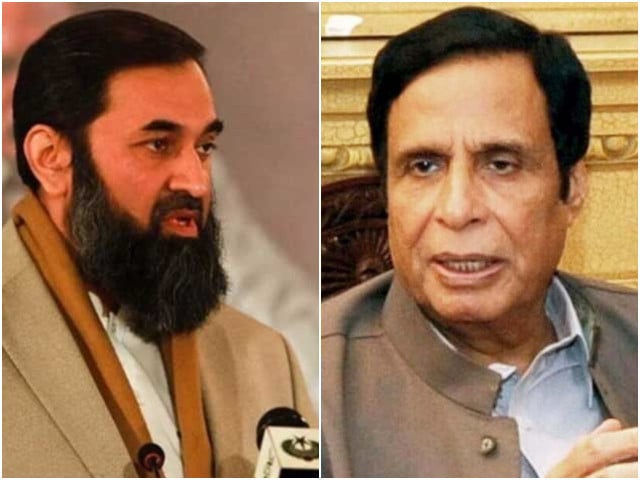LAHORE: The Lahore High Court’s larger bench sought further arguments by January 12 (tomorrow) on Punjab Chief Minister Chaudhry Pervaiz Elahi’s plea, challenging Governor Balighur Rehman’s two orders including de-notifying him and his cabinet, with a clear direction that the undertaking submitted by the CM of not dissolving assembly will not be violated.
The LHC resumed the hearing of the CM’s petition against his de-notification by Governor Balighur Rehman for not taking a vote of confidence under Article 130 (7) of the Constitution.
A five-member full bench of the high court under the chairmanship of Abidi Aziz Sheikh is hearing the case. The bench was constituted by LHC Chief Justice Ameer Bhatti.
The Pakistan Tehreek-e-Insaf (PTI), which is in power in the province, had sought to dissolve the provincial assembly in order to force the federal government to call early elections while the ruling Pakistan Muslim League-Nawaz (PML-N) countered the move through Punjab Governor Balighur Rehman.
The governor had de-notified CM Pervaiz Elahi in the wee hours of December 23, 2022, for failing to take a vote of confidence from the provincial assembly on December 21, on his order.
A notification issued by the Governor House after midnight said that CM Elahi ceased to hold office immediately while the provincial cabinet stood dissolved. However, it added that Elahi would continue under Article 133 of the Constitution until a new chief minister was elected by the provincial assembly.
However, the CM maintained that he would not seek a vote of confidence from the Punjab Assembly on Governor Balighur Rehman’s order, terming his directions in this regard as illegal.
Meanwhile, the LHC in its December 28 order, while reinstating the PML-Q leader, had bound the CM through an undertaking not to dissolve the provincial assembly until the next hearing scheduled for January 11.
After hearing the arguments of the Punjab government and others, the LHC had suspended the notification following Elahi’s undertaking that he would not dissolve the assembly before the next hearing.
In another twist to the high drama in Punjab’s power echelon, last week, the speaker brought forward the provincial assembly session by two days – from Jan 11 to Jan 9, causing political circles to spin up a whirlwind of wild speculation about whether Chief Minister Pervaiz Elahi was getting ready to take a vote of confidence.
The Punjab Assembly yesterday witnessed a ruckus as lawmakers from both sides of the aisle engaged in a verbal slugfest over the vote of confidence to be taken from Elahi.
As proceedings commenced today, the bench’s head Justice Abid Aziz Sheikh asked Elahi’s counsel barrister Ali Zafar and federation “whether you people have reached on any consensus over the matter of time frame about vote of confidence”.
Attorney General for Pakistan Mansoor Usman Awan argued that the sufficient time frame had been given them for vote of confidence but the CM remained failed in obtaining the vote of confidence.
“If both parties agree on a date this bench will fix that date for vote of confidence,” Justice Abid Aziz remarked. At which barrister Ali Zafar argued that they did not agree owing to some reasons which establish the illegality of the Punjab governor’s directives.
“Mr Ali Zafar do you not see that prevailing political circumstances are enough for vote of confidence or you are sticking to your argument that present circumstances are not enough for vote of confidence,” Justice Abid Aziz remarked.
“We have not to see only the circumstances… we have to see what actually the Constitution says,” barrister Ali Zafar replied. If you are not interested to reach on a consensus on a date for vote of confidence then we will hear this matter on merit, Justice Abid Aziz addressing barrister Ali Zafar remarked.
Detailed arguments
“We have no objection if the case is decided on merit,” barrister Ali Zafar told the court. However, during his arguments Ali Zafar described how Elahi was elected as Punjab CM. He also told the court that how the then deputy speaker Punjab Assembly, Sardar Dost Muhammad Mazari discarded PML-Q’s ten votes, a ruling which was later set aside by the Supreme Court of Pakistan.
What was the fault of CM Elahi
The arguments of barrister Ali Zafar revolved around “it was the matter purely between Speaker Punjab Assembly Muhammad Sibtain Khan and the Governor Punjab but what fault was of his client who had been de-notified by the governor”.
The governor directed CM Elahi under relevant article requiring him to obtain vote of confidence but the Speaker Punjab Assembly did not agree with the reasons relying upon the governor directed for vote of confidence. The speaker also did not agree with the short time given by the governor for said purpose. Neither the governor could summon assembly session when the assembly session is already in progress nor has the speaker’s ruling been challenged at any forum by the governor’s side. So under such circumstances how could CM Elahi be de-notified assuming he failed in getting vote of confidence. There is no any sort of effort on CM Elahi’s part which could establish that he deliberately restrained himself from taking vote of confidence. When there is a scuffle between A and B so how the C could be punished, he asked.
But floor of the House is to be tested
At which bench’s head Justice Abid Aziz remarked that constitutionally the governor could direct CM requiring him to obtain vote of confidence. If governor exercises his power so under this clause the floor of the House is to be tested, Justice Abid Aziz remarked.
Two ways to remove CM
Barrister Ali Zafar argued that there are two ways to remove the CM. One is relating to a resolution if submitted with 20 per cent strength of the lawmakers and the second one is the governor directs the CM to take the vote of confidence.
He differentiating both ways argued the CM could dissolve the assembly if governor directs him to get vote of confidence. The CM could not dissolve assembly after process starts on a resolution submitted by 20 per cent lawmakers against the CM, claiming he has lost trust of the majority. The Constitution requires cogent reasons if the CM is asked for vote of confidence, he argued.
What are the parameters?
On a point, bench’s head Justice Abid Aziz asked the barrister Ali Zafar what are the parameters which you believe are the cogent reasons for directing the CM to obtain vote of confidence.
Barrister Ali Zafar argued that the Constitution requires that if the CM losses majority he will have to obtain vote of confidence. For the sake of argument if PTI’s 91 and the PML-Q’s 6 lawmakers approach the governor and inform him that they have no confidence on the CM which means the CM has lost majority of the lawmakers confidence then he would have to obtain vote of confidence. But it could not be considered a cogent reason if governor dreams one day that CM has lost majority and waking up the next morning and directs the CM to take vote of confidence.
PML-N played the Constitution
He further argued that PML-N lawmakers submitted the no-trust motion in Punjab Assembly on same day when the governor directed CM for getting vote of confidence. The purpose of PML-N’s withdrawal of no-trust motion was that it does not have required numbers in its camp. On the other hand PTI has to show its strength in vote of confidence directed by the governor. It is real example of the mockery of Constitution. This is all done by the PML-N when the matter is still pending in court.
Bench’s head Justice Abid Aziz observed that “Mr Ali Zafar there is a Supreme Court’s judgement upon whether or not the governor could summon the session for the purpose of vote of confidence at a time when assembly session is already in progress. Secondly the sufficient time will be granted to CM for vote of confidence and now shed light on your third point that governor did not elaborate cogent reasons requiring the CM to obtain vote of confidence”.
During his arguments, Ali Zafar termed the reasons given by the governor as “irrelevant and immature”.
However, the court directed him to put his further arguments by January 12 (tomorrow).




No comment